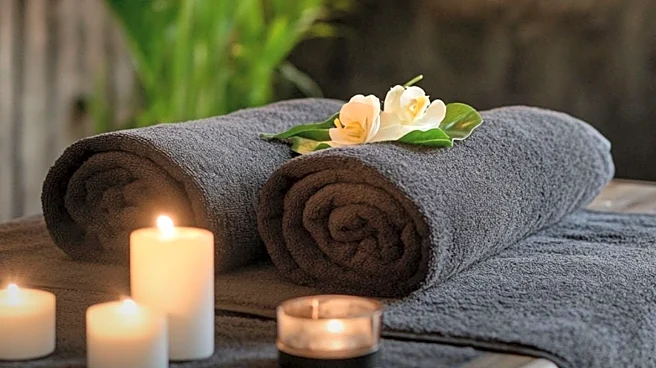What's Happening?
Surya Wellness Spa, located in the Proper Hotel in Santa Monica, offers a distinctive massage experience known as the Abhyanga service. This service involves a four-handed, light-touch massage using warm herbalized oils, which are steeped overnight. The
spa, founded by Martha Soffer, integrates ancient Ayurvedic practices with a modern California sensibility. The spa's offerings, including the Panchakarma series, have attracted a following among wellness enthusiasts and celebrities. The Abhyanga massage is designed to promote relaxation and harmony, utilizing synchronized movements by two therapists to enhance the therapeutic effects.
Why It's Important?
The introduction of such unique wellness services highlights the growing trend of integrating traditional healing practices with modern wellness approaches in the U.S. This trend reflects a broader societal shift towards holistic health and self-care, emphasizing mental and physical well-being. The popularity of Surya Wellness Spa's services among high-profile clients underscores the increasing demand for personalized and luxurious wellness experiences. This could influence the wellness industry to further explore and incorporate diverse cultural practices, potentially leading to a more inclusive and varied market.
What's Next?
As the wellness industry continues to evolve, other spas and wellness centers may adopt similar practices, integrating traditional methods with contemporary wellness trends. This could lead to increased competition and innovation within the industry, as businesses strive to offer unique and effective services. Additionally, the success of Surya Wellness Spa may inspire further exploration of Ayurvedic practices in the U.S., potentially leading to greater awareness and acceptance of these ancient healing techniques.
Beyond the Headlines
The integration of Ayurvedic practices into modern wellness routines raises questions about cultural appropriation and the ethical considerations of adapting traditional practices for commercial purposes. It also highlights the importance of respecting and preserving the cultural heritage of such practices while making them accessible to a broader audience. As the wellness industry grows, it will be crucial to balance innovation with cultural sensitivity and authenticity.

















